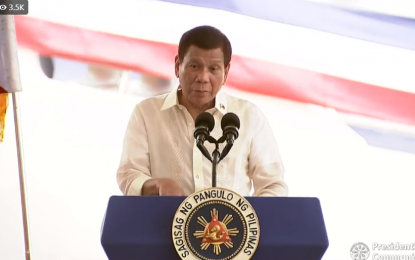MANILA – Outgoing President Rodrigo R. Duterte on Sunday said he wants to someday join the Philippine Coast Guard (PCG) on its visit to the West Philippine Sea (WPS) as a civilian despite knowing that it would be a “gamble.”
 President Rodrigo Roa Duterte (Screengrab from RTVM/PCOO)
President Rodrigo Roa Duterte (Screengrab from RTVM/PCOO)
He made this remark in a speech during the commissioning of Barko ng Pangulo ng Pilipinas (BRP) Melchora Aquino — the Multi-Role Response Vessel (MRRV) 9702 of the Philippine Coast Guard (PCG) — at Pier 15, South Harbor in Manila.
“Someday I could maybe ride with the Coast Guard to see. Maski na civilian na ako, sana bigyan ninyo akong kaunting ano lang (Even if I am already a civilian, I hope you give me a little…) that you can invite me to ride with you…. It does not have any ramifications because civilian na ako (would be a civilian by then). And I could maybe ride with you diyan sa (to the) West Philippine Sea. It is a gamble,” he said.
Duterte acknowledged that China has laid claim to almost 90 percent of the South China Sea, but noted that the Philippines would never give up fighting for Philippine sovereign rights in the disputed sea.
“You have at one time in our national life that we have to assert the — what is ours…Kaibigan ko si President Xi Jinping (is my friend). And we have talked a lot in the so many visits that I did in the past years. Pero (But) I made it clear to him na (that) we cannot give up sovereignty over the waters sa (in the) Philippine Sea, including the exclusive economic zone because it’s vital for our national life,” he added
Amid criticisms that his administration has downplayed the Philippines’ sea dispute with China in exchange for economic benefits, Duterte advanced the country’s rights in the West Philippine Sea by raising the arbitral award in fora such as the United Nations General Assembly in 2020 and 2021.
Meanwhile, Duterte also lauded the PCG for its “excellent record” of helping the government in “maintaining its independence and integrity as a republic.”
He also praised Transport Secretary Arthur Tugade for “husbanding” the PCG through the formal commissioning of the brand new capital ship BRP Melchora Aquino.
“We have gone a long way to improve. Pasalamat ako kay (I am thankful for) Arthur, including the railways. In our own humble way, sabi nga niya (he said), we delivered,” he added.
On July 12, 2016, the Philippines won the arbitration case it lodged against China after the Permanent Court of Arbitration in The Hague, Netherlands invalidated Beijing’s nine-dash line claim over the South China Sea.
China refused to acknowledge the arbitral ruling.
Duterte reiterated that the Philippines could not afford going to war with China.
“We cannot win and we will lose and the population will suffer. The Filipino nation would be in a very tight situation, a quandary of how to go about I said navigating the geopolitical issues in Europe and here, Taiwan,” he said.
He said he is praying that the two countries could resolve the sea row “by just talking.”
“There’s really no need to kill a human being,” he added.
BRP Melchora Aquino
Duterte granted permission to the Commanding Officer and first watch or sentinel “to set the watch” that will commence BRP Melchora Aquino’s official duty as a commissioned vessel and rendered a salute to acknowledge the said vessel.
“By the authority vested in me as President of the Republic of the Philippines, I hereby commission BRP Melchora Aquino also known as MRRV-9702…” Duterte said in his speech during the formal commissioning of the PCG vessel.
MRRV 9702, named after Melchora Aquino, popularly known as “Tandang Sora” and Mother of Katipunan, is one of the two largest white ships acquired by the Department of Transportation (DOTr) for the PCG through its Maritime Safety Capability Improvement Project (MSCIP) Phase 2.
It is ready to conduct sustained maritime patrols in the country’s maritime jurisdictions, including the West Philippine Sea and Philippine Rise.
Similar with BRP Teresa Magbanua (MRRV 9701), the MRRV 9702 is modeled after the Japan Coast Guard’s Kunigami-class vessel that has a maximum speed of not less than 24 nautical miles per hour and endurance of not less than 4,000 nautical miles.
